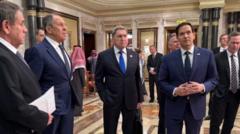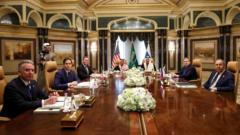Ahmed al-Shara, recently appointed as Syria’s interim president, embarked on his first foreign visit to Saudi Arabia, marking a significant moment in Syria’s evolving political landscape post-Bashar al-Assad.
Syria's Interim President Ahmed al-Shara Visits Saudi Arabia Amid Shift in Alliances

Syria's Interim President Ahmed al-Shara Visits Saudi Arabia Amid Shift in Alliances
Ahmed al-Shara's inaugural international trip highlights changing geopolitical dynamics in the region.
Syria’s newly appointed interim president, Ahmed al-Shara, touched down in Saudi Arabia on Sunday for his first international journey following the ousting of the long-standing dictator Bashar al-Assad by the rebel coalition he leads. Arriving in Riyadh, the capital where he spent his formative years, al-Shara is expected to engage in discussions with Crown Prince Mohammed bin Salman, focusing on enhancing bilateral relations and working towards the relief of international sanctions against Syria.
This choice of Saudi Arabia as al-Shara's first destination reflects a strategic pivot for Syria's new leadership away from its previous reliance on Iran and towards more favorable ties with Gulf nations. This diplomatic overture also highlights a broader shift in the Middle Eastern geopolitical landscape, influenced by regional turmoil, including recent conflicts involving Israel.
In the backdrop of al-Shara's ascendance to power, Syria has witnessed an influx of diplomatic activity, with envoys from Europe, the United States, the Gulf States, and Russia visiting Damascus. The nature of these meetings will play a crucial role in redefining Syria's political structure and the larger power dynamics in the Middle East, especially in light of Iran’s waning influence due to Israel’s military actions against its allies and the challenges faced by Russia after the Assad regime's collapse.
Simultaneously, Turkey continues to assert its presence in the region, leveraging its support for Syrian rebels to gain strategic advantages. The continued evolution of alliances and enmities will be closely monitored as Syria navigates its post-Assad era.
This choice of Saudi Arabia as al-Shara's first destination reflects a strategic pivot for Syria's new leadership away from its previous reliance on Iran and towards more favorable ties with Gulf nations. This diplomatic overture also highlights a broader shift in the Middle Eastern geopolitical landscape, influenced by regional turmoil, including recent conflicts involving Israel.
In the backdrop of al-Shara's ascendance to power, Syria has witnessed an influx of diplomatic activity, with envoys from Europe, the United States, the Gulf States, and Russia visiting Damascus. The nature of these meetings will play a crucial role in redefining Syria's political structure and the larger power dynamics in the Middle East, especially in light of Iran’s waning influence due to Israel’s military actions against its allies and the challenges faced by Russia after the Assad regime's collapse.
Simultaneously, Turkey continues to assert its presence in the region, leveraging its support for Syrian rebels to gain strategic advantages. The continued evolution of alliances and enmities will be closely monitored as Syria navigates its post-Assad era.






















